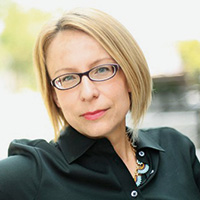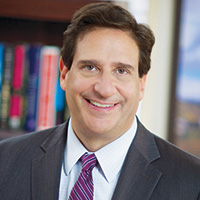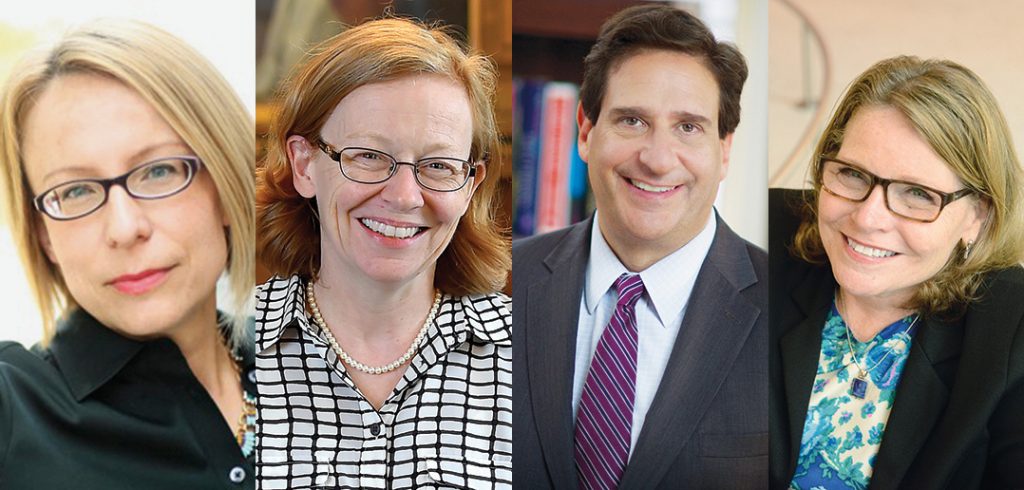This fall, four Fordham schools feature new leaders (above, from left): Eva Badowska, PhD, has helped develop new degree programs at the Graduate School of Arts and Sciences; Maura Mast, PhD, has a keen interest in promoting interdisciplinary research at Fordham College at Rose Hill; Matthew Diller is focused on career outcomes for Fordham Law students; and Virginia Roach, EdD, at the Graduate School of Education, says “Fordham’s focus on social justice … is what makes it so unique.”
Read more about the new deans.
Q&A with Graduate School of Arts and Sciences Dean Eva Badowska

When she became dean of the Graduate School of Arts and Sciences (GSAS) on July 1, Eva Badowska, PhD, had already begun several long-term efforts to prepare the school for changes in the world of higher education. As acting and then interim dean in the prior 13 months, she had heeded a mentor’s advice to make the most of her time in the job even if it might soon be taken over by someone else. “You have to take it on faith that some of your work would roll over and continue, and that if it did not, then it wouldn’t for good reasons,” she said.
Her initiatives include GSAS Futures, a professional-development program for students, the Fellowship in Higher Education Leadership, a mentoring program for future academic leaders, as well as new master’s degree programs. She also chairs the President’s Task Force on the Future of Liberal Education.
Mathematics, Liberal Arts Come Together in New Dean’s Approach

As someone who majored in both mathematics and anthropology as an undergraduate, Maura Mast, PhD, has a keen interest in seeing how very different fields can be brought together. Promoting more interdisciplinary research and programs is one of her top priorities as dean of Fordham College at Rose Hill, a job she took over last month.
Mast earned her bachelor’s degree cum laude from the University of Notre Dame and her doctorate in mathematics from the University of North Carolina before joining the faculty of the University of Massachusetts at Boston. A tenured associate professor of mathematics at the university since 2002 and an active researcher in the area of differential geometry, she has won numerous awards for teaching and is a nationally recognized expert in the field of quantitative reasoning. She has held leadership roles with the Association for Women in Mathematics, the Joint Committee on Women in the Mathematical Sciences, and the Special Interest Group of the Mathematical Association of America on Quantitative Literacy. She is deeply committed to Catholic higher education, which she focused on as a fellow of the American Council on Education in 2012–2013.
Over the past six years, while serving as associate vice provost for undergraduate studies and then as special assistant to the provost at UMass Boston, she helped establish worldwide educational partnerships and worked with deans and faculty to expand and enhance academic programs. She is co-author of a textbook, Common Sense Mathematics, to be published by the Mathematical Association of America this year.
New Dean Sets Priorities for Law School
 In January, Matthew Diller was appointed dean of Fordham Law School, after serving as dean of Cardozo School of Law from 2009 to 2014. His appointment was a homecoming, as Diller taught on the Fordham Law faculty for 16 years and served as associate dean for academic affairs from 2003 to 2008.
In January, Matthew Diller was appointed dean of Fordham Law School, after serving as dean of Cardozo School of Law from 2009 to 2014. His appointment was a homecoming, as Diller taught on the Fordham Law faculty for 16 years and served as associate dean for academic affairs from 2003 to 2008.
What brought you back to Fordham?
Fordham feels like my academic home. It’s where I learned to be a teacher and learned to be a scholar. The faculty has many of my mentors, who’ve had a major impact on my life and my career. Many of the colleagues that I started out with as a junior faculty member are now in senior positions.
What are your top priorities for the school?
My priorities are to continuously ask the question ‘How can we better prepare and educate our students to meet the demands of the marketplace of today and of the future?’ One thing that attracts me to Fordham is that the faculty is already deeply engaged with that issue, and [the school]has already undertaken a number of major reforms.
Q&A with Graduate School of Education Dean Virginia Roach

Virginia Roach, EdD, taught elementary education before education policy became her primary passion. Her research has focused on students with disabilities in education reform and on female leadership in education among differing nations, including Ethiopia and New Zealand. As the new dean of the Graduate School of Education, she merges class experience and research with practical policy knowledge.
Why did you want to lead Fordham’s Graduate School of Education?
In my field we care for the whole child, not just the test score number. I wanted to be at a place that thinks about children in the context of their family, their community, and how we build a citizenry based on those factors. I also wanted to be somewhere with a research orientation alongside a strong value base.
Why, nowadays, is education policy so contentious?
Everybody went through an education, so everybody feels that they’re expert in the field. People have lived experiences that form their strong opinions. But my experience as a white person is not the same experience as someone who is African American. And my experience of coming from a working-class background is not the same as those who went to private school their whole lives. It’s incumbent on educators to look at everyone’s experience, and to make sure that policy makers don’t unwittingly create policy that favors one group over another but seeks to create equity across the system.

